Accounting in Context: Forensic Accounting in Retail Sector UK
VerifiedAdded on 2021/04/21
|17
|6777
|363
Report
AI Summary
This report investigates the influence of forensic accounting on addressing deceptive and fraudulent activities, aiming to ensure robust corporate governance in UK retail firms. It highlights forensic accounting as a crucial tool for combating financial crimes and ensuring corporate governance. The study examines a retail corporation's structure and organizational hierarchy, focusing on how forensic accounting can aid in detecting and preventing fraud, as requested by the Financial Director. The report analyzes key issues, synthesizes arguments from academic articles, and presents recommendations to enhance fraud detection efforts and strengthen corporate governance in the retail sector. It emphasizes the importance of forensic accounting services in fraud prevention and the need for increased public awareness and demand for these services.
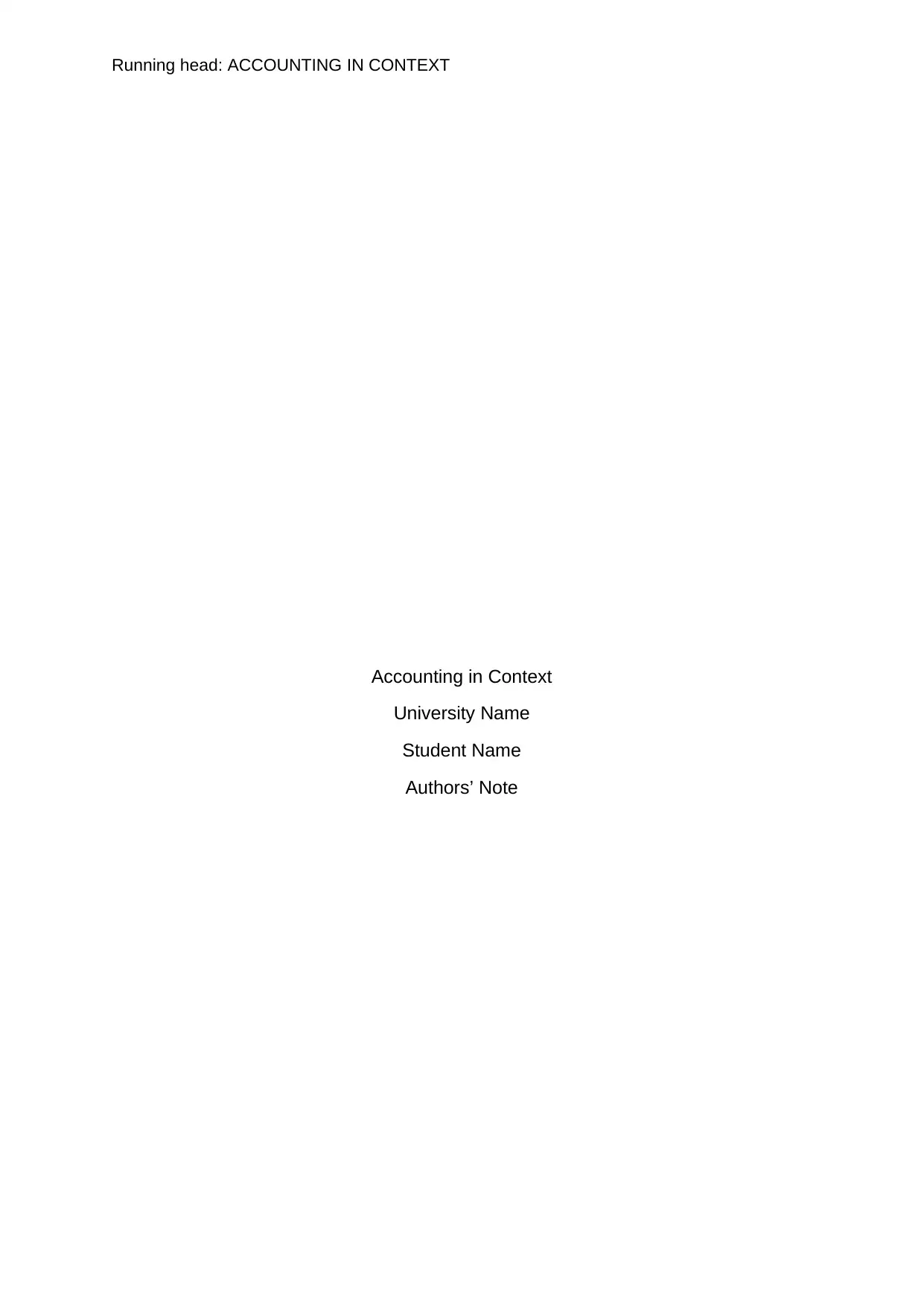
Running head: ACCOUNTING IN CONTEXT
Accounting in Context
University Name
Student Name
Authors’ Note
Accounting in Context
University Name
Student Name
Authors’ Note
Paraphrase This Document
Need a fresh take? Get an instant paraphrase of this document with our AI Paraphraser
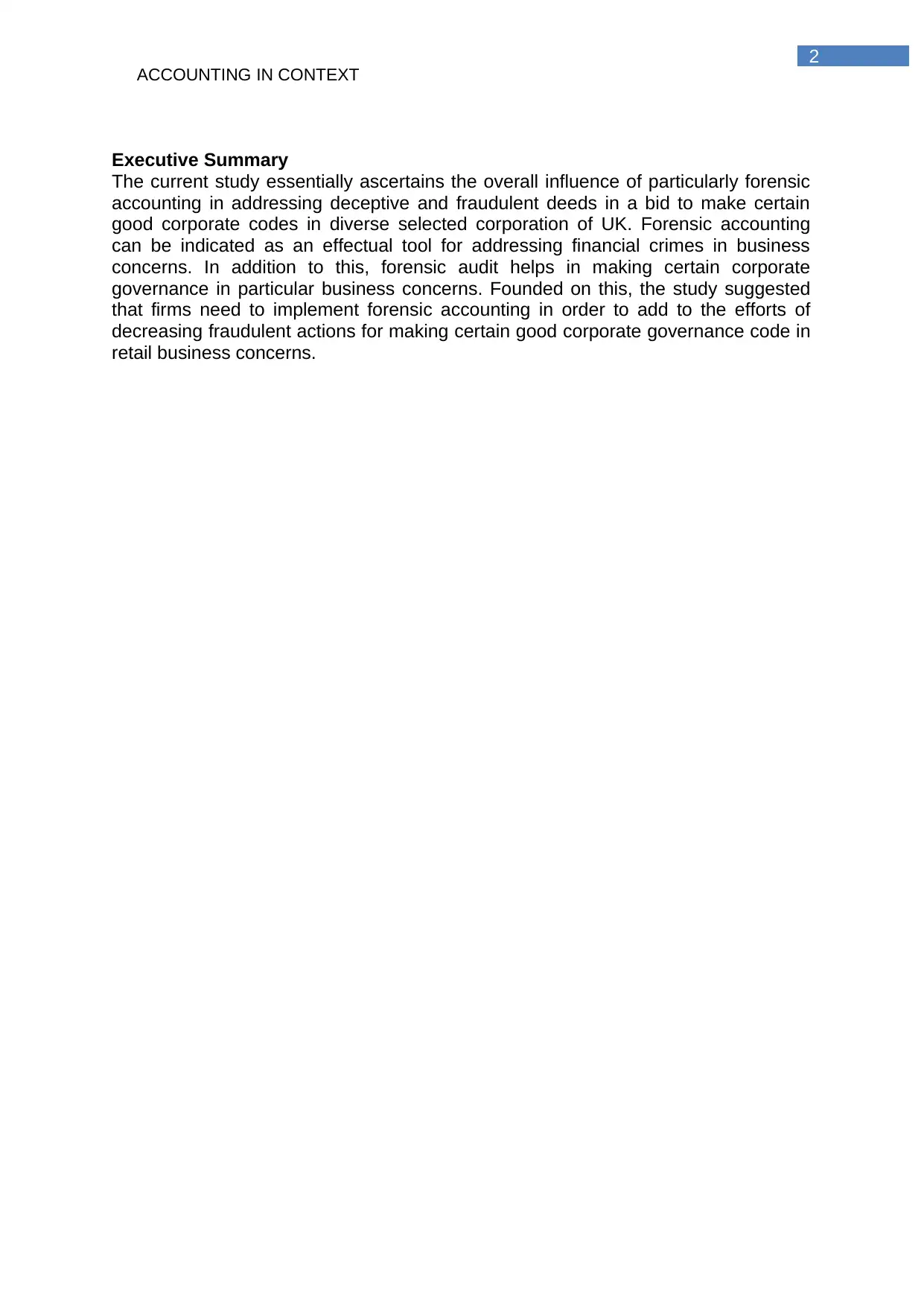
2
ACCOUNTING IN CONTEXT
Executive Summary
The current study essentially ascertains the overall influence of particularly forensic
accounting in addressing deceptive and fraudulent deeds in a bid to make certain
good corporate codes in diverse selected corporation of UK. Forensic accounting
can be indicated as an effectual tool for addressing financial crimes in business
concerns. In addition to this, forensic audit helps in making certain corporate
governance in particular business concerns. Founded on this, the study suggested
that firms need to implement forensic accounting in order to add to the efforts of
decreasing fraudulent actions for making certain good corporate governance code in
retail business concerns.
ACCOUNTING IN CONTEXT
Executive Summary
The current study essentially ascertains the overall influence of particularly forensic
accounting in addressing deceptive and fraudulent deeds in a bid to make certain
good corporate codes in diverse selected corporation of UK. Forensic accounting
can be indicated as an effectual tool for addressing financial crimes in business
concerns. In addition to this, forensic audit helps in making certain corporate
governance in particular business concerns. Founded on this, the study suggested
that firms need to implement forensic accounting in order to add to the efforts of
decreasing fraudulent actions for making certain good corporate governance code in
retail business concerns.
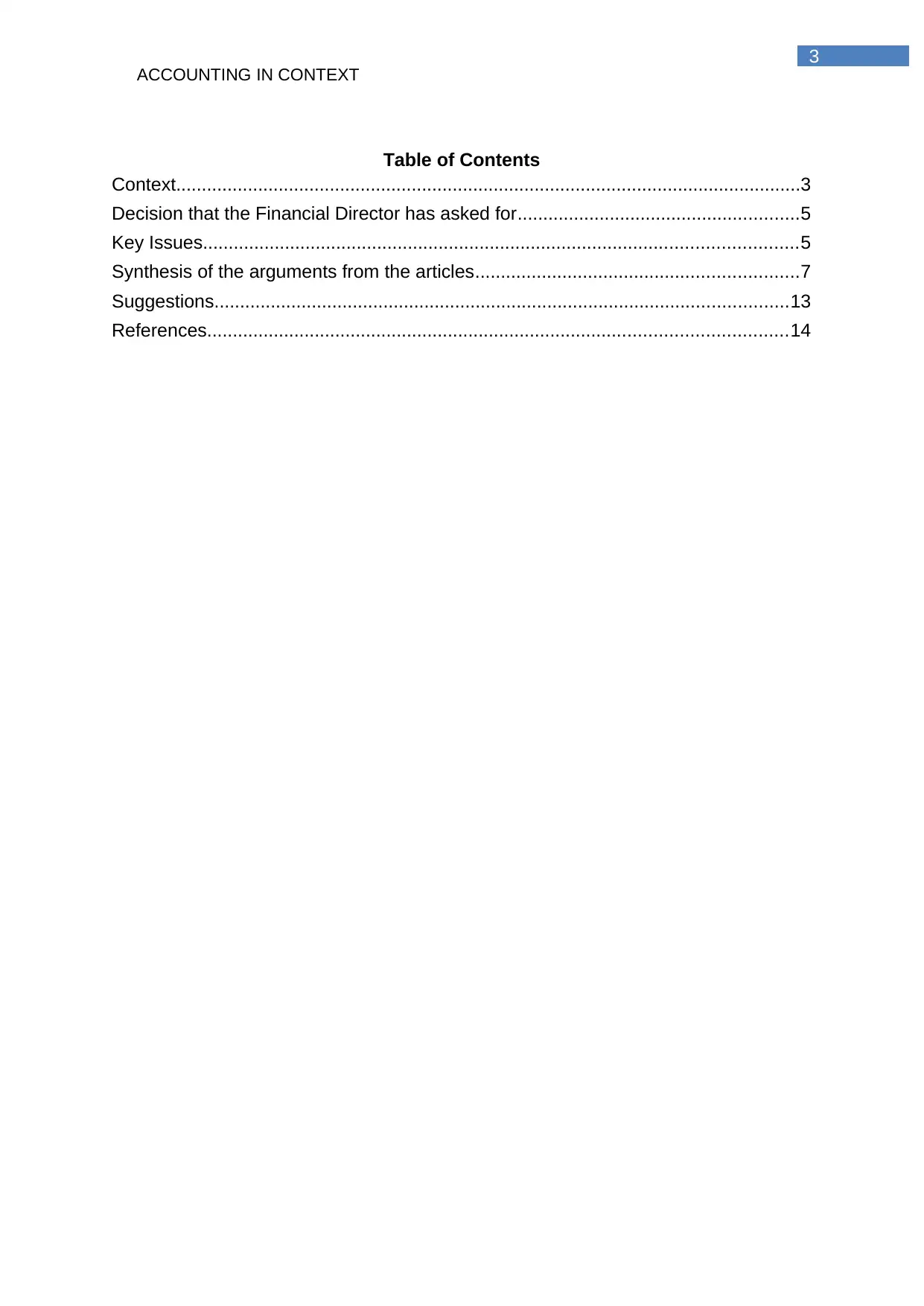
3
ACCOUNTING IN CONTEXT
Table of Contents
Context..........................................................................................................................3
Decision that the Financial Director has asked for.......................................................5
Key Issues....................................................................................................................5
Synthesis of the arguments from the articles...............................................................7
Suggestions................................................................................................................13
References.................................................................................................................14
ACCOUNTING IN CONTEXT
Table of Contents
Context..........................................................................................................................3
Decision that the Financial Director has asked for.......................................................5
Key Issues....................................................................................................................5
Synthesis of the arguments from the articles...............................................................7
Suggestions................................................................................................................13
References.................................................................................................................14
⊘ This is a preview!⊘
Do you want full access?
Subscribe today to unlock all pages.

Trusted by 1+ million students worldwide
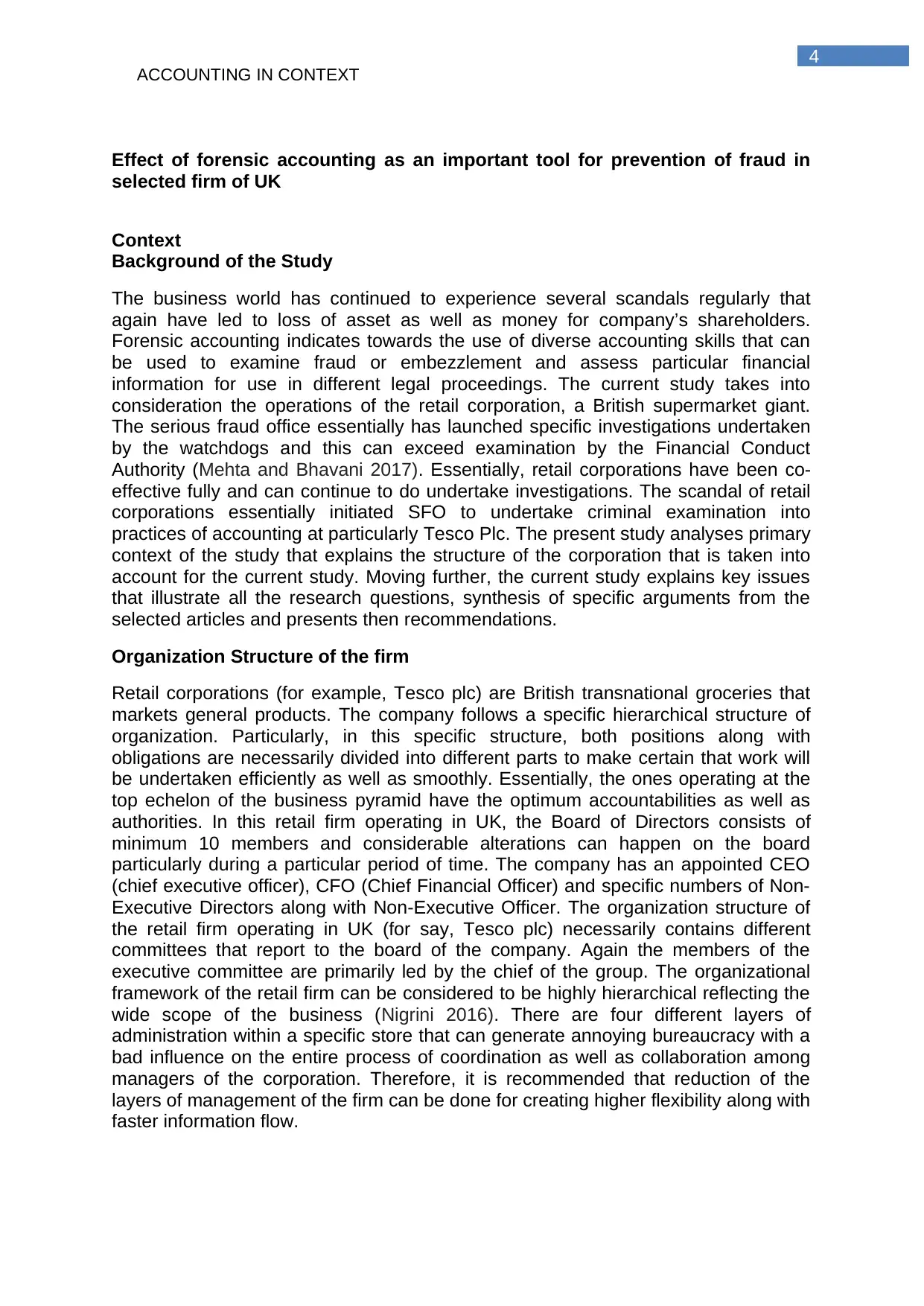
4
ACCOUNTING IN CONTEXT
Effect of forensic accounting as an important tool for prevention of fraud in
selected firm of UK
Context
Background of the Study
The business world has continued to experience several scandals regularly that
again have led to loss of asset as well as money for company’s shareholders.
Forensic accounting indicates towards the use of diverse accounting skills that can
be used to examine fraud or embezzlement and assess particular financial
information for use in different legal proceedings. The current study takes into
consideration the operations of the retail corporation, a British supermarket giant.
The serious fraud office essentially has launched specific investigations undertaken
by the watchdogs and this can exceed examination by the Financial Conduct
Authority (Mehta and Bhavani 2017). Essentially, retail corporations have been co-
effective fully and can continue to do undertake investigations. The scandal of retail
corporations essentially initiated SFO to undertake criminal examination into
practices of accounting at particularly Tesco Plc. The present study analyses primary
context of the study that explains the structure of the corporation that is taken into
account for the current study. Moving further, the current study explains key issues
that illustrate all the research questions, synthesis of specific arguments from the
selected articles and presents then recommendations.
Organization Structure of the firm
Retail corporations (for example, Tesco plc) are British transnational groceries that
markets general products. The company follows a specific hierarchical structure of
organization. Particularly, in this specific structure, both positions along with
obligations are necessarily divided into different parts to make certain that work will
be undertaken efficiently as well as smoothly. Essentially, the ones operating at the
top echelon of the business pyramid have the optimum accountabilities as well as
authorities. In this retail firm operating in UK, the Board of Directors consists of
minimum 10 members and considerable alterations can happen on the board
particularly during a particular period of time. The company has an appointed CEO
(chief executive officer), CFO (Chief Financial Officer) and specific numbers of Non-
Executive Directors along with Non-Executive Officer. The organization structure of
the retail firm operating in UK (for say, Tesco plc) necessarily contains different
committees that report to the board of the company. Again the members of the
executive committee are primarily led by the chief of the group. The organizational
framework of the retail firm can be considered to be highly hierarchical reflecting the
wide scope of the business (Nigrini 2016). There are four different layers of
administration within a specific store that can generate annoying bureaucracy with a
bad influence on the entire process of coordination as well as collaboration among
managers of the corporation. Therefore, it is recommended that reduction of the
layers of management of the firm can be done for creating higher flexibility along with
faster information flow.
ACCOUNTING IN CONTEXT
Effect of forensic accounting as an important tool for prevention of fraud in
selected firm of UK
Context
Background of the Study
The business world has continued to experience several scandals regularly that
again have led to loss of asset as well as money for company’s shareholders.
Forensic accounting indicates towards the use of diverse accounting skills that can
be used to examine fraud or embezzlement and assess particular financial
information for use in different legal proceedings. The current study takes into
consideration the operations of the retail corporation, a British supermarket giant.
The serious fraud office essentially has launched specific investigations undertaken
by the watchdogs and this can exceed examination by the Financial Conduct
Authority (Mehta and Bhavani 2017). Essentially, retail corporations have been co-
effective fully and can continue to do undertake investigations. The scandal of retail
corporations essentially initiated SFO to undertake criminal examination into
practices of accounting at particularly Tesco Plc. The present study analyses primary
context of the study that explains the structure of the corporation that is taken into
account for the current study. Moving further, the current study explains key issues
that illustrate all the research questions, synthesis of specific arguments from the
selected articles and presents then recommendations.
Organization Structure of the firm
Retail corporations (for example, Tesco plc) are British transnational groceries that
markets general products. The company follows a specific hierarchical structure of
organization. Particularly, in this specific structure, both positions along with
obligations are necessarily divided into different parts to make certain that work will
be undertaken efficiently as well as smoothly. Essentially, the ones operating at the
top echelon of the business pyramid have the optimum accountabilities as well as
authorities. In this retail firm operating in UK, the Board of Directors consists of
minimum 10 members and considerable alterations can happen on the board
particularly during a particular period of time. The company has an appointed CEO
(chief executive officer), CFO (Chief Financial Officer) and specific numbers of Non-
Executive Directors along with Non-Executive Officer. The organization structure of
the retail firm operating in UK (for say, Tesco plc) necessarily contains different
committees that report to the board of the company. Again the members of the
executive committee are primarily led by the chief of the group. The organizational
framework of the retail firm can be considered to be highly hierarchical reflecting the
wide scope of the business (Nigrini 2016). There are four different layers of
administration within a specific store that can generate annoying bureaucracy with a
bad influence on the entire process of coordination as well as collaboration among
managers of the corporation. Therefore, it is recommended that reduction of the
layers of management of the firm can be done for creating higher flexibility along with
faster information flow.
Paraphrase This Document
Need a fresh take? Get an instant paraphrase of this document with our AI Paraphraser
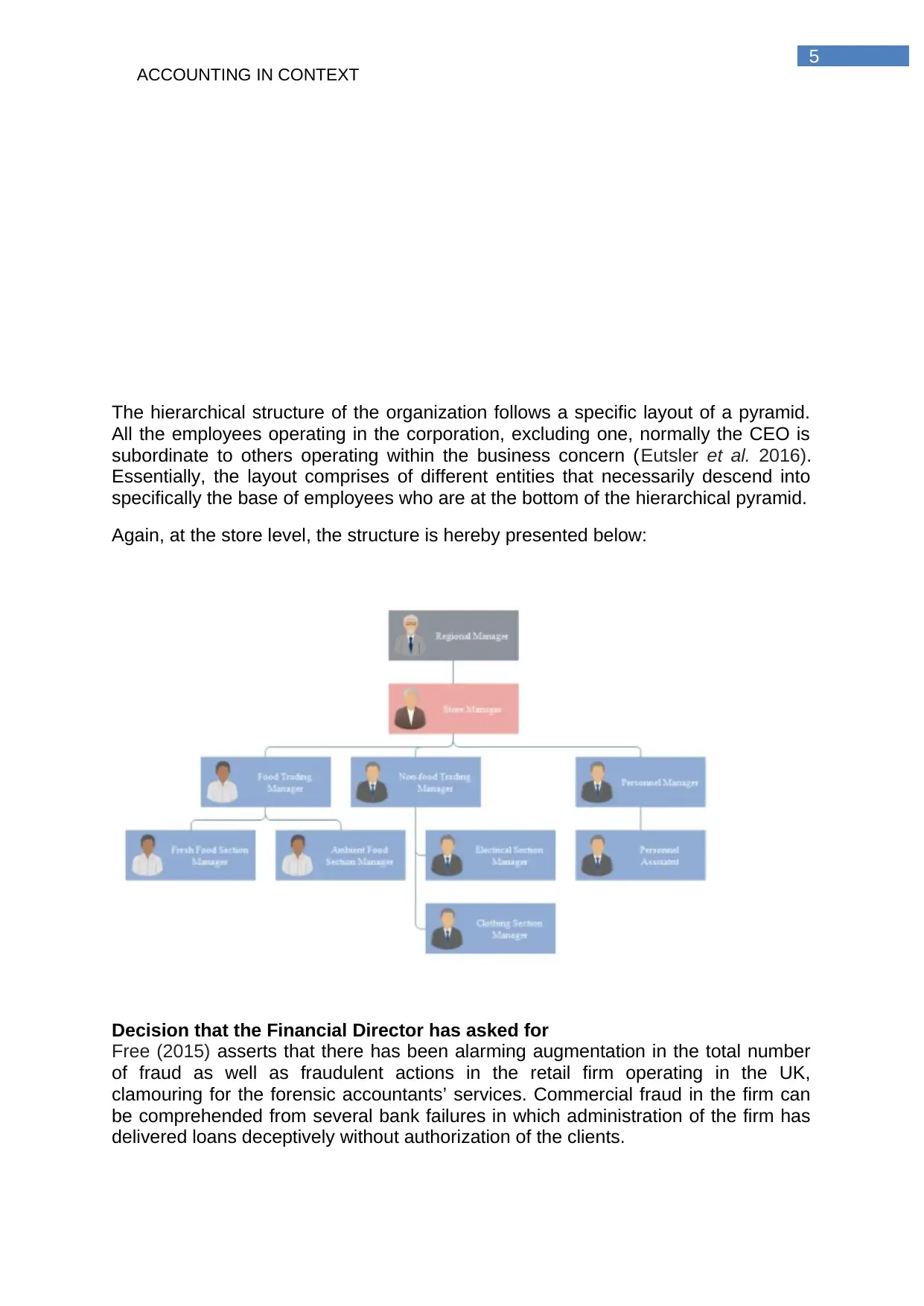
5
ACCOUNTING IN CONTEXT
The hierarchical structure of the organization follows a specific layout of a pyramid.
All the employees operating in the corporation, excluding one, normally the CEO is
subordinate to others operating within the business concern (Eutsler et al. 2016).
Essentially, the layout comprises of different entities that necessarily descend into
specifically the base of employees who are at the bottom of the hierarchical pyramid.
Again, at the store level, the structure is hereby presented below:
Decision that the Financial Director has asked for
Free (2015) asserts that there has been alarming augmentation in the total number
of fraud as well as fraudulent actions in the retail firm operating in the UK,
clamouring for the forensic accountants’ services. Commercial fraud in the firm can
be comprehended from several bank failures in which administration of the firm has
delivered loans deceptively without authorization of the clients.
ACCOUNTING IN CONTEXT
The hierarchical structure of the organization follows a specific layout of a pyramid.
All the employees operating in the corporation, excluding one, normally the CEO is
subordinate to others operating within the business concern (Eutsler et al. 2016).
Essentially, the layout comprises of different entities that necessarily descend into
specifically the base of employees who are at the bottom of the hierarchical pyramid.
Again, at the store level, the structure is hereby presented below:
Decision that the Financial Director has asked for
Free (2015) asserts that there has been alarming augmentation in the total number
of fraud as well as fraudulent actions in the retail firm operating in the UK,
clamouring for the forensic accountants’ services. Commercial fraud in the firm can
be comprehended from several bank failures in which administration of the firm has
delivered loans deceptively without authorization of the clients.
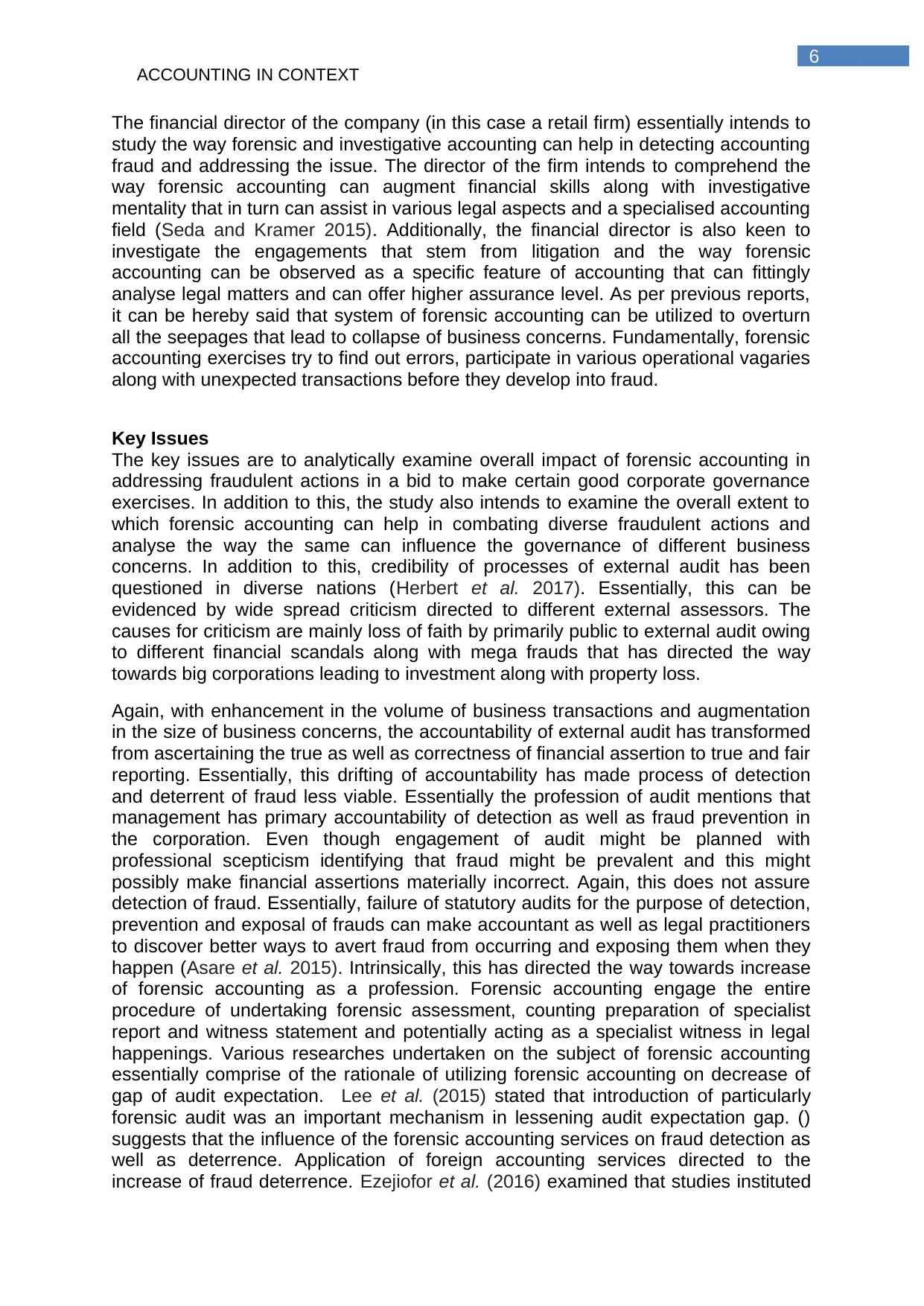
6
ACCOUNTING IN CONTEXT
The financial director of the company (in this case a retail firm) essentially intends to
study the way forensic and investigative accounting can help in detecting accounting
fraud and addressing the issue. The director of the firm intends to comprehend the
way forensic accounting can augment financial skills along with investigative
mentality that in turn can assist in various legal aspects and a specialised accounting
field (Seda and Kramer 2015). Additionally, the financial director is also keen to
investigate the engagements that stem from litigation and the way forensic
accounting can be observed as a specific feature of accounting that can fittingly
analyse legal matters and can offer higher assurance level. As per previous reports,
it can be hereby said that system of forensic accounting can be utilized to overturn
all the seepages that lead to collapse of business concerns. Fundamentally, forensic
accounting exercises try to find out errors, participate in various operational vagaries
along with unexpected transactions before they develop into fraud.
Key Issues
The key issues are to analytically examine overall impact of forensic accounting in
addressing fraudulent actions in a bid to make certain good corporate governance
exercises. In addition to this, the study also intends to examine the overall extent to
which forensic accounting can help in combating diverse fraudulent actions and
analyse the way the same can influence the governance of different business
concerns. In addition to this, credibility of processes of external audit has been
questioned in diverse nations (Herbert et al. 2017). Essentially, this can be
evidenced by wide spread criticism directed to different external assessors. The
causes for criticism are mainly loss of faith by primarily public to external audit owing
to different financial scandals along with mega frauds that has directed the way
towards big corporations leading to investment along with property loss.
Again, with enhancement in the volume of business transactions and augmentation
in the size of business concerns, the accountability of external audit has transformed
from ascertaining the true as well as correctness of financial assertion to true and fair
reporting. Essentially, this drifting of accountability has made process of detection
and deterrent of fraud less viable. Essentially the profession of audit mentions that
management has primary accountability of detection as well as fraud prevention in
the corporation. Even though engagement of audit might be planned with
professional scepticism identifying that fraud might be prevalent and this might
possibly make financial assertions materially incorrect. Again, this does not assure
detection of fraud. Essentially, failure of statutory audits for the purpose of detection,
prevention and exposal of frauds can make accountant as well as legal practitioners
to discover better ways to avert fraud from occurring and exposing them when they
happen (Asare et al. 2015). Intrinsically, this has directed the way towards increase
of forensic accounting as a profession. Forensic accounting engage the entire
procedure of undertaking forensic assessment, counting preparation of specialist
report and witness statement and potentially acting as a specialist witness in legal
happenings. Various researches undertaken on the subject of forensic accounting
essentially comprise of the rationale of utilizing forensic accounting on decrease of
gap of audit expectation. Lee et al. (2015) stated that introduction of particularly
forensic audit was an important mechanism in lessening audit expectation gap. ()
suggests that the influence of the forensic accounting services on fraud detection as
well as deterrence. Application of foreign accounting services directed to the
increase of fraud deterrence. Ezejiofor et al. (2016) examined that studies instituted
ACCOUNTING IN CONTEXT
The financial director of the company (in this case a retail firm) essentially intends to
study the way forensic and investigative accounting can help in detecting accounting
fraud and addressing the issue. The director of the firm intends to comprehend the
way forensic accounting can augment financial skills along with investigative
mentality that in turn can assist in various legal aspects and a specialised accounting
field (Seda and Kramer 2015). Additionally, the financial director is also keen to
investigate the engagements that stem from litigation and the way forensic
accounting can be observed as a specific feature of accounting that can fittingly
analyse legal matters and can offer higher assurance level. As per previous reports,
it can be hereby said that system of forensic accounting can be utilized to overturn
all the seepages that lead to collapse of business concerns. Fundamentally, forensic
accounting exercises try to find out errors, participate in various operational vagaries
along with unexpected transactions before they develop into fraud.
Key Issues
The key issues are to analytically examine overall impact of forensic accounting in
addressing fraudulent actions in a bid to make certain good corporate governance
exercises. In addition to this, the study also intends to examine the overall extent to
which forensic accounting can help in combating diverse fraudulent actions and
analyse the way the same can influence the governance of different business
concerns. In addition to this, credibility of processes of external audit has been
questioned in diverse nations (Herbert et al. 2017). Essentially, this can be
evidenced by wide spread criticism directed to different external assessors. The
causes for criticism are mainly loss of faith by primarily public to external audit owing
to different financial scandals along with mega frauds that has directed the way
towards big corporations leading to investment along with property loss.
Again, with enhancement in the volume of business transactions and augmentation
in the size of business concerns, the accountability of external audit has transformed
from ascertaining the true as well as correctness of financial assertion to true and fair
reporting. Essentially, this drifting of accountability has made process of detection
and deterrent of fraud less viable. Essentially the profession of audit mentions that
management has primary accountability of detection as well as fraud prevention in
the corporation. Even though engagement of audit might be planned with
professional scepticism identifying that fraud might be prevalent and this might
possibly make financial assertions materially incorrect. Again, this does not assure
detection of fraud. Essentially, failure of statutory audits for the purpose of detection,
prevention and exposal of frauds can make accountant as well as legal practitioners
to discover better ways to avert fraud from occurring and exposing them when they
happen (Asare et al. 2015). Intrinsically, this has directed the way towards increase
of forensic accounting as a profession. Forensic accounting engage the entire
procedure of undertaking forensic assessment, counting preparation of specialist
report and witness statement and potentially acting as a specialist witness in legal
happenings. Various researches undertaken on the subject of forensic accounting
essentially comprise of the rationale of utilizing forensic accounting on decrease of
gap of audit expectation. Lee et al. (2015) stated that introduction of particularly
forensic audit was an important mechanism in lessening audit expectation gap. ()
suggests that the influence of the forensic accounting services on fraud detection as
well as deterrence. Application of foreign accounting services directed to the
increase of fraud deterrence. Ezejiofor et al. (2016) examined that studies instituted
⊘ This is a preview!⊘
Do you want full access?
Subscribe today to unlock all pages.

Trusted by 1+ million students worldwide
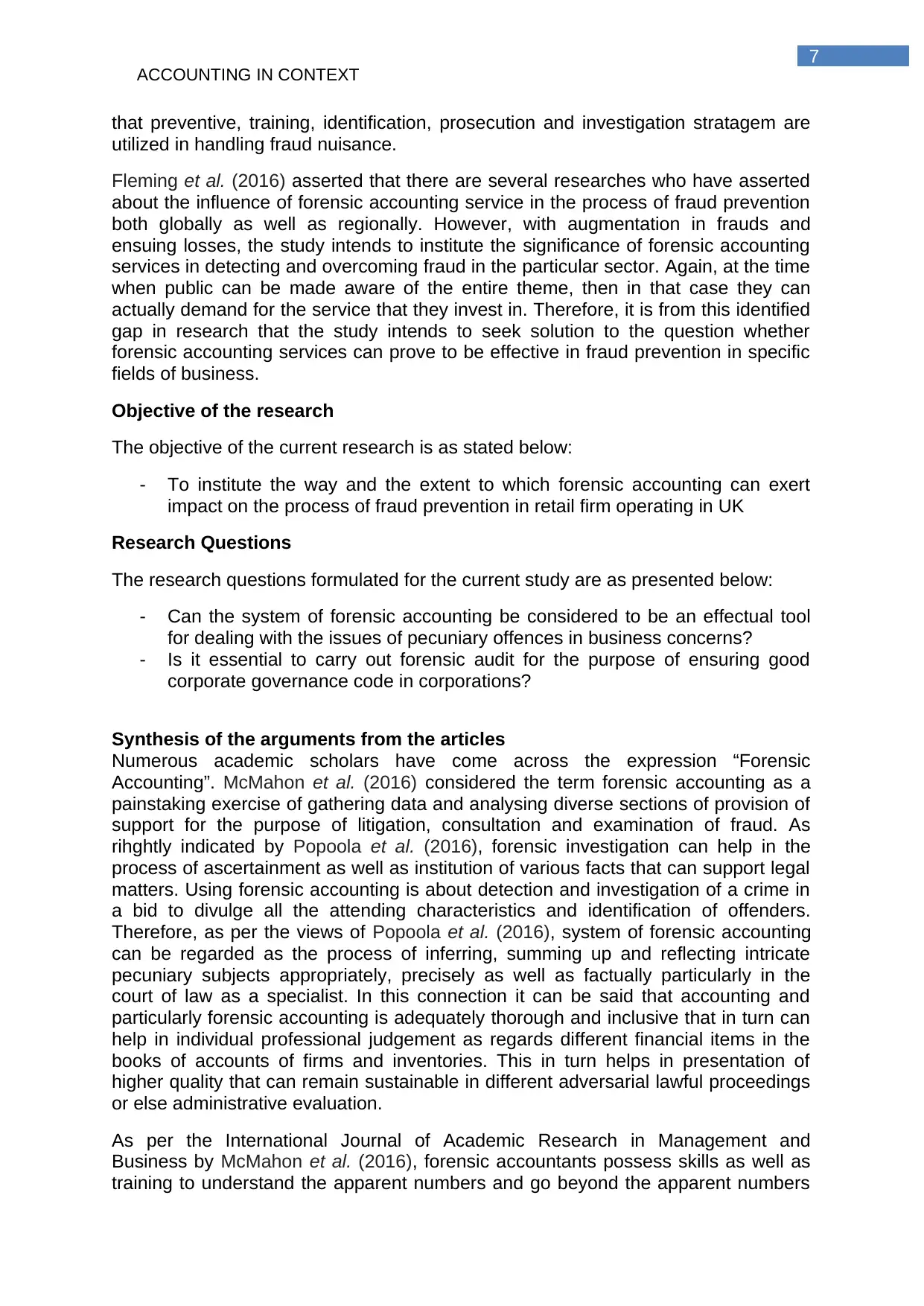
7
ACCOUNTING IN CONTEXT
that preventive, training, identification, prosecution and investigation stratagem are
utilized in handling fraud nuisance.
Fleming et al. (2016) asserted that there are several researches who have asserted
about the influence of forensic accounting service in the process of fraud prevention
both globally as well as regionally. However, with augmentation in frauds and
ensuing losses, the study intends to institute the significance of forensic accounting
services in detecting and overcoming fraud in the particular sector. Again, at the time
when public can be made aware of the entire theme, then in that case they can
actually demand for the service that they invest in. Therefore, it is from this identified
gap in research that the study intends to seek solution to the question whether
forensic accounting services can prove to be effective in fraud prevention in specific
fields of business.
Objective of the research
The objective of the current research is as stated below:
- To institute the way and the extent to which forensic accounting can exert
impact on the process of fraud prevention in retail firm operating in UK
Research Questions
The research questions formulated for the current study are as presented below:
- Can the system of forensic accounting be considered to be an effectual tool
for dealing with the issues of pecuniary offences in business concerns?
- Is it essential to carry out forensic audit for the purpose of ensuring good
corporate governance code in corporations?
Synthesis of the arguments from the articles
Numerous academic scholars have come across the expression “Forensic
Accounting”. McMahon et al. (2016) considered the term forensic accounting as a
painstaking exercise of gathering data and analysing diverse sections of provision of
support for the purpose of litigation, consultation and examination of fraud. As
rihghtly indicated by Popoola et al. (2016), forensic investigation can help in the
process of ascertainment as well as institution of various facts that can support legal
matters. Using forensic accounting is about detection and investigation of a crime in
a bid to divulge all the attending characteristics and identification of offenders.
Therefore, as per the views of Popoola et al. (2016), system of forensic accounting
can be regarded as the process of inferring, summing up and reflecting intricate
pecuniary subjects appropriately, precisely as well as factually particularly in the
court of law as a specialist. In this connection it can be said that accounting and
particularly forensic accounting is adequately thorough and inclusive that in turn can
help in individual professional judgement as regards different financial items in the
books of accounts of firms and inventories. This in turn helps in presentation of
higher quality that can remain sustainable in different adversarial lawful proceedings
or else administrative evaluation.
As per the International Journal of Academic Research in Management and
Business by McMahon et al. (2016), forensic accountants possess skills as well as
training to understand the apparent numbers and go beyond the apparent numbers
ACCOUNTING IN CONTEXT
that preventive, training, identification, prosecution and investigation stratagem are
utilized in handling fraud nuisance.
Fleming et al. (2016) asserted that there are several researches who have asserted
about the influence of forensic accounting service in the process of fraud prevention
both globally as well as regionally. However, with augmentation in frauds and
ensuing losses, the study intends to institute the significance of forensic accounting
services in detecting and overcoming fraud in the particular sector. Again, at the time
when public can be made aware of the entire theme, then in that case they can
actually demand for the service that they invest in. Therefore, it is from this identified
gap in research that the study intends to seek solution to the question whether
forensic accounting services can prove to be effective in fraud prevention in specific
fields of business.
Objective of the research
The objective of the current research is as stated below:
- To institute the way and the extent to which forensic accounting can exert
impact on the process of fraud prevention in retail firm operating in UK
Research Questions
The research questions formulated for the current study are as presented below:
- Can the system of forensic accounting be considered to be an effectual tool
for dealing with the issues of pecuniary offences in business concerns?
- Is it essential to carry out forensic audit for the purpose of ensuring good
corporate governance code in corporations?
Synthesis of the arguments from the articles
Numerous academic scholars have come across the expression “Forensic
Accounting”. McMahon et al. (2016) considered the term forensic accounting as a
painstaking exercise of gathering data and analysing diverse sections of provision of
support for the purpose of litigation, consultation and examination of fraud. As
rihghtly indicated by Popoola et al. (2016), forensic investigation can help in the
process of ascertainment as well as institution of various facts that can support legal
matters. Using forensic accounting is about detection and investigation of a crime in
a bid to divulge all the attending characteristics and identification of offenders.
Therefore, as per the views of Popoola et al. (2016), system of forensic accounting
can be regarded as the process of inferring, summing up and reflecting intricate
pecuniary subjects appropriately, precisely as well as factually particularly in the
court of law as a specialist. In this connection it can be said that accounting and
particularly forensic accounting is adequately thorough and inclusive that in turn can
help in individual professional judgement as regards different financial items in the
books of accounts of firms and inventories. This in turn helps in presentation of
higher quality that can remain sustainable in different adversarial lawful proceedings
or else administrative evaluation.
As per the International Journal of Academic Research in Management and
Business by McMahon et al. (2016), forensic accountants possess skills as well as
training to understand the apparent numbers and go beyond the apparent numbers
Paraphrase This Document
Need a fresh take? Get an instant paraphrase of this document with our AI Paraphraser
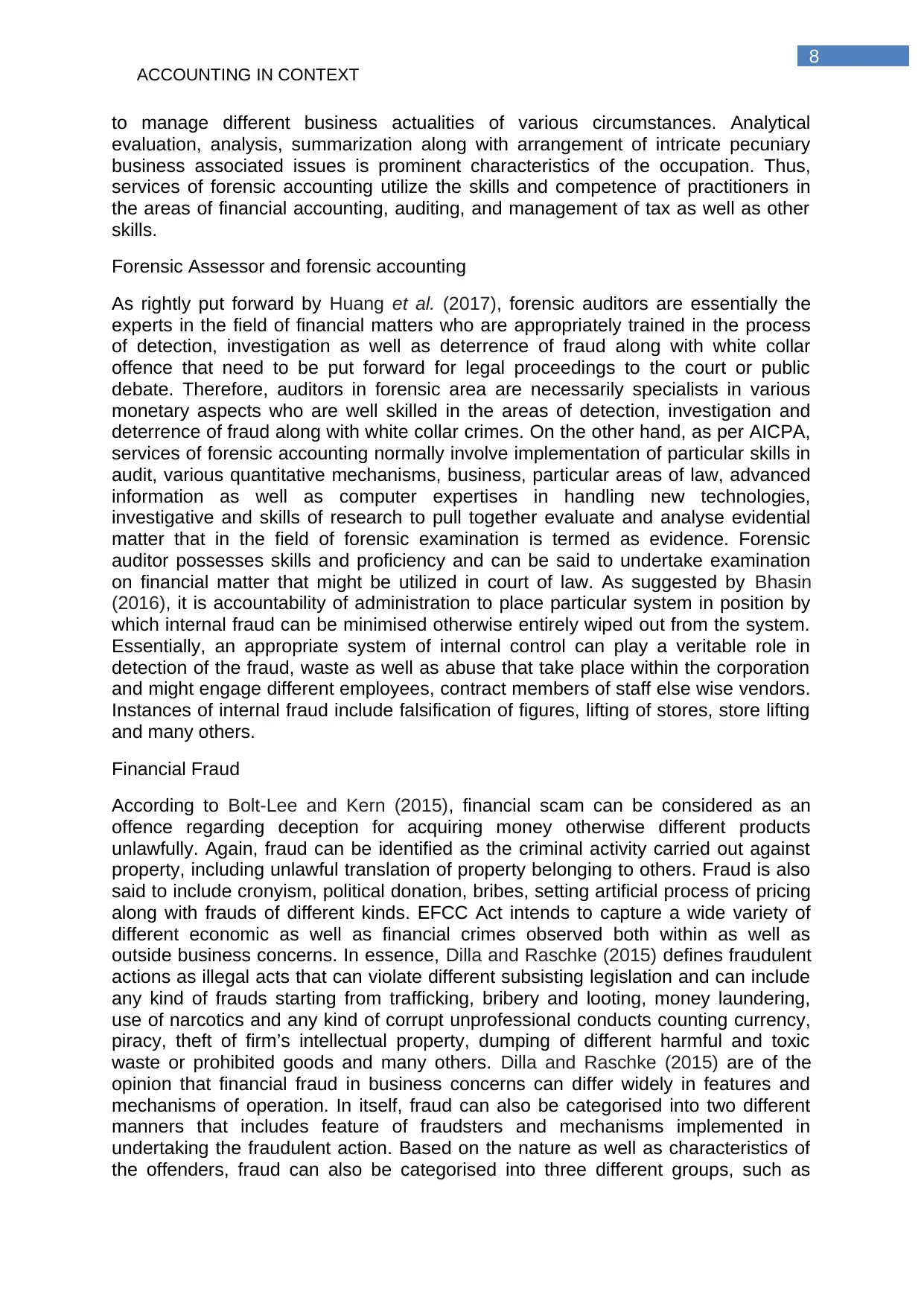
8
ACCOUNTING IN CONTEXT
to manage different business actualities of various circumstances. Analytical
evaluation, analysis, summarization along with arrangement of intricate pecuniary
business associated issues is prominent characteristics of the occupation. Thus,
services of forensic accounting utilize the skills and competence of practitioners in
the areas of financial accounting, auditing, and management of tax as well as other
skills.
Forensic Assessor and forensic accounting
As rightly put forward by Huang et al. (2017), forensic auditors are essentially the
experts in the field of financial matters who are appropriately trained in the process
of detection, investigation as well as deterrence of fraud along with white collar
offence that need to be put forward for legal proceedings to the court or public
debate. Therefore, auditors in forensic area are necessarily specialists in various
monetary aspects who are well skilled in the areas of detection, investigation and
deterrence of fraud along with white collar crimes. On the other hand, as per AICPA,
services of forensic accounting normally involve implementation of particular skills in
audit, various quantitative mechanisms, business, particular areas of law, advanced
information as well as computer expertises in handling new technologies,
investigative and skills of research to pull together evaluate and analyse evidential
matter that in the field of forensic examination is termed as evidence. Forensic
auditor possesses skills and proficiency and can be said to undertake examination
on financial matter that might be utilized in court of law. As suggested by Bhasin
(2016), it is accountability of administration to place particular system in position by
which internal fraud can be minimised otherwise entirely wiped out from the system.
Essentially, an appropriate system of internal control can play a veritable role in
detection of the fraud, waste as well as abuse that take place within the corporation
and might engage different employees, contract members of staff else wise vendors.
Instances of internal fraud include falsification of figures, lifting of stores, store lifting
and many others.
Financial Fraud
According to Bolt-Lee and Kern (2015), financial scam can be considered as an
offence regarding deception for acquiring money otherwise different products
unlawfully. Again, fraud can be identified as the criminal activity carried out against
property, including unlawful translation of property belonging to others. Fraud is also
said to include cronyism, political donation, bribes, setting artificial process of pricing
along with frauds of different kinds. EFCC Act intends to capture a wide variety of
different economic as well as financial crimes observed both within as well as
outside business concerns. In essence, Dilla and Raschke (2015) defines fraudulent
actions as illegal acts that can violate different subsisting legislation and can include
any kind of frauds starting from trafficking, bribery and looting, money laundering,
use of narcotics and any kind of corrupt unprofessional conducts counting currency,
piracy, theft of firm’s intellectual property, dumping of different harmful and toxic
waste or prohibited goods and many others. Dilla and Raschke (2015) are of the
opinion that financial fraud in business concerns can differ widely in features and
mechanisms of operation. In itself, fraud can also be categorised into two different
manners that includes feature of fraudsters and mechanisms implemented in
undertaking the fraudulent action. Based on the nature as well as characteristics of
the offenders, fraud can also be categorised into three different groups, such as
ACCOUNTING IN CONTEXT
to manage different business actualities of various circumstances. Analytical
evaluation, analysis, summarization along with arrangement of intricate pecuniary
business associated issues is prominent characteristics of the occupation. Thus,
services of forensic accounting utilize the skills and competence of practitioners in
the areas of financial accounting, auditing, and management of tax as well as other
skills.
Forensic Assessor and forensic accounting
As rightly put forward by Huang et al. (2017), forensic auditors are essentially the
experts in the field of financial matters who are appropriately trained in the process
of detection, investigation as well as deterrence of fraud along with white collar
offence that need to be put forward for legal proceedings to the court or public
debate. Therefore, auditors in forensic area are necessarily specialists in various
monetary aspects who are well skilled in the areas of detection, investigation and
deterrence of fraud along with white collar crimes. On the other hand, as per AICPA,
services of forensic accounting normally involve implementation of particular skills in
audit, various quantitative mechanisms, business, particular areas of law, advanced
information as well as computer expertises in handling new technologies,
investigative and skills of research to pull together evaluate and analyse evidential
matter that in the field of forensic examination is termed as evidence. Forensic
auditor possesses skills and proficiency and can be said to undertake examination
on financial matter that might be utilized in court of law. As suggested by Bhasin
(2016), it is accountability of administration to place particular system in position by
which internal fraud can be minimised otherwise entirely wiped out from the system.
Essentially, an appropriate system of internal control can play a veritable role in
detection of the fraud, waste as well as abuse that take place within the corporation
and might engage different employees, contract members of staff else wise vendors.
Instances of internal fraud include falsification of figures, lifting of stores, store lifting
and many others.
Financial Fraud
According to Bolt-Lee and Kern (2015), financial scam can be considered as an
offence regarding deception for acquiring money otherwise different products
unlawfully. Again, fraud can be identified as the criminal activity carried out against
property, including unlawful translation of property belonging to others. Fraud is also
said to include cronyism, political donation, bribes, setting artificial process of pricing
along with frauds of different kinds. EFCC Act intends to capture a wide variety of
different economic as well as financial crimes observed both within as well as
outside business concerns. In essence, Dilla and Raschke (2015) defines fraudulent
actions as illegal acts that can violate different subsisting legislation and can include
any kind of frauds starting from trafficking, bribery and looting, money laundering,
use of narcotics and any kind of corrupt unprofessional conducts counting currency,
piracy, theft of firm’s intellectual property, dumping of different harmful and toxic
waste or prohibited goods and many others. Dilla and Raschke (2015) are of the
opinion that financial fraud in business concerns can differ widely in features and
mechanisms of operation. In itself, fraud can also be categorised into two different
manners that includes feature of fraudsters and mechanisms implemented in
undertaking the fraudulent action. Based on the nature as well as characteristics of
the offenders, fraud can also be categorised into three different groups, such as
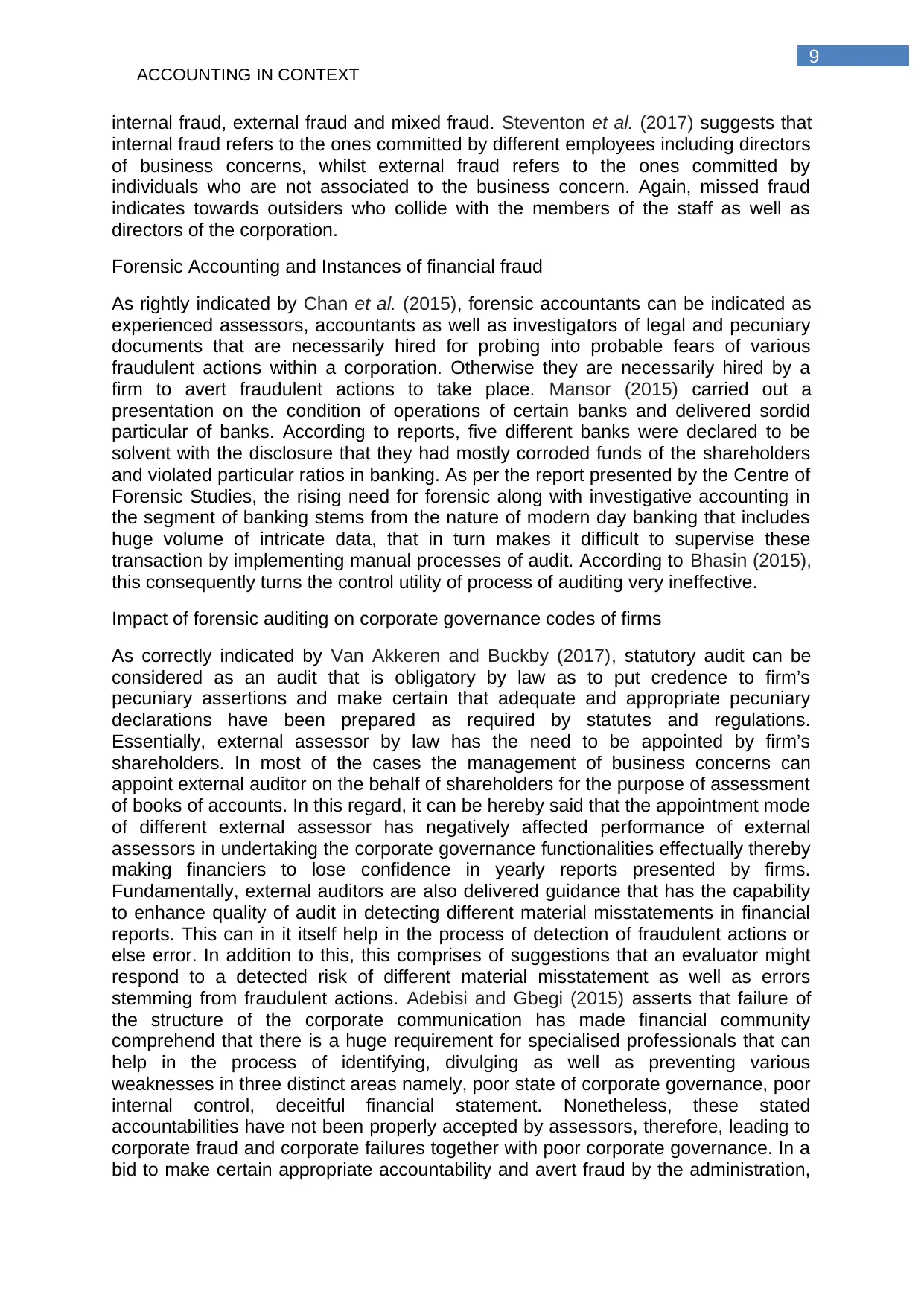
9
ACCOUNTING IN CONTEXT
internal fraud, external fraud and mixed fraud. Steventon et al. (2017) suggests that
internal fraud refers to the ones committed by different employees including directors
of business concerns, whilst external fraud refers to the ones committed by
individuals who are not associated to the business concern. Again, missed fraud
indicates towards outsiders who collide with the members of the staff as well as
directors of the corporation.
Forensic Accounting and Instances of financial fraud
As rightly indicated by Chan et al. (2015), forensic accountants can be indicated as
experienced assessors, accountants as well as investigators of legal and pecuniary
documents that are necessarily hired for probing into probable fears of various
fraudulent actions within a corporation. Otherwise they are necessarily hired by a
firm to avert fraudulent actions to take place. Mansor (2015) carried out a
presentation on the condition of operations of certain banks and delivered sordid
particular of banks. According to reports, five different banks were declared to be
solvent with the disclosure that they had mostly corroded funds of the shareholders
and violated particular ratios in banking. As per the report presented by the Centre of
Forensic Studies, the rising need for forensic along with investigative accounting in
the segment of banking stems from the nature of modern day banking that includes
huge volume of intricate data, that in turn makes it difficult to supervise these
transaction by implementing manual processes of audit. According to Bhasin (2015),
this consequently turns the control utility of process of auditing very ineffective.
Impact of forensic auditing on corporate governance codes of firms
As correctly indicated by Van Akkeren and Buckby (2017), statutory audit can be
considered as an audit that is obligatory by law as to put credence to firm’s
pecuniary assertions and make certain that adequate and appropriate pecuniary
declarations have been prepared as required by statutes and regulations.
Essentially, external assessor by law has the need to be appointed by firm’s
shareholders. In most of the cases the management of business concerns can
appoint external auditor on the behalf of shareholders for the purpose of assessment
of books of accounts. In this regard, it can be hereby said that the appointment mode
of different external assessor has negatively affected performance of external
assessors in undertaking the corporate governance functionalities effectually thereby
making financiers to lose confidence in yearly reports presented by firms.
Fundamentally, external auditors are also delivered guidance that has the capability
to enhance quality of audit in detecting different material misstatements in financial
reports. This can in it itself help in the process of detection of fraudulent actions or
else error. In addition to this, this comprises of suggestions that an evaluator might
respond to a detected risk of different material misstatement as well as errors
stemming from fraudulent actions. Adebisi and Gbegi (2015) asserts that failure of
the structure of the corporate communication has made financial community
comprehend that there is a huge requirement for specialised professionals that can
help in the process of identifying, divulging as well as preventing various
weaknesses in three distinct areas namely, poor state of corporate governance, poor
internal control, deceitful financial statement. Nonetheless, these stated
accountabilities have not been properly accepted by assessors, therefore, leading to
corporate fraud and corporate failures together with poor corporate governance. In a
bid to make certain appropriate accountability and avert fraud by the administration,
ACCOUNTING IN CONTEXT
internal fraud, external fraud and mixed fraud. Steventon et al. (2017) suggests that
internal fraud refers to the ones committed by different employees including directors
of business concerns, whilst external fraud refers to the ones committed by
individuals who are not associated to the business concern. Again, missed fraud
indicates towards outsiders who collide with the members of the staff as well as
directors of the corporation.
Forensic Accounting and Instances of financial fraud
As rightly indicated by Chan et al. (2015), forensic accountants can be indicated as
experienced assessors, accountants as well as investigators of legal and pecuniary
documents that are necessarily hired for probing into probable fears of various
fraudulent actions within a corporation. Otherwise they are necessarily hired by a
firm to avert fraudulent actions to take place. Mansor (2015) carried out a
presentation on the condition of operations of certain banks and delivered sordid
particular of banks. According to reports, five different banks were declared to be
solvent with the disclosure that they had mostly corroded funds of the shareholders
and violated particular ratios in banking. As per the report presented by the Centre of
Forensic Studies, the rising need for forensic along with investigative accounting in
the segment of banking stems from the nature of modern day banking that includes
huge volume of intricate data, that in turn makes it difficult to supervise these
transaction by implementing manual processes of audit. According to Bhasin (2015),
this consequently turns the control utility of process of auditing very ineffective.
Impact of forensic auditing on corporate governance codes of firms
As correctly indicated by Van Akkeren and Buckby (2017), statutory audit can be
considered as an audit that is obligatory by law as to put credence to firm’s
pecuniary assertions and make certain that adequate and appropriate pecuniary
declarations have been prepared as required by statutes and regulations.
Essentially, external assessor by law has the need to be appointed by firm’s
shareholders. In most of the cases the management of business concerns can
appoint external auditor on the behalf of shareholders for the purpose of assessment
of books of accounts. In this regard, it can be hereby said that the appointment mode
of different external assessor has negatively affected performance of external
assessors in undertaking the corporate governance functionalities effectually thereby
making financiers to lose confidence in yearly reports presented by firms.
Fundamentally, external auditors are also delivered guidance that has the capability
to enhance quality of audit in detecting different material misstatements in financial
reports. This can in it itself help in the process of detection of fraudulent actions or
else error. In addition to this, this comprises of suggestions that an evaluator might
respond to a detected risk of different material misstatement as well as errors
stemming from fraudulent actions. Adebisi and Gbegi (2015) asserts that failure of
the structure of the corporate communication has made financial community
comprehend that there is a huge requirement for specialised professionals that can
help in the process of identifying, divulging as well as preventing various
weaknesses in three distinct areas namely, poor state of corporate governance, poor
internal control, deceitful financial statement. Nonetheless, these stated
accountabilities have not been properly accepted by assessors, therefore, leading to
corporate fraud and corporate failures together with poor corporate governance. In a
bid to make certain appropriate accountability and avert fraud by the administration,
⊘ This is a preview!⊘
Do you want full access?
Subscribe today to unlock all pages.

Trusted by 1+ million students worldwide
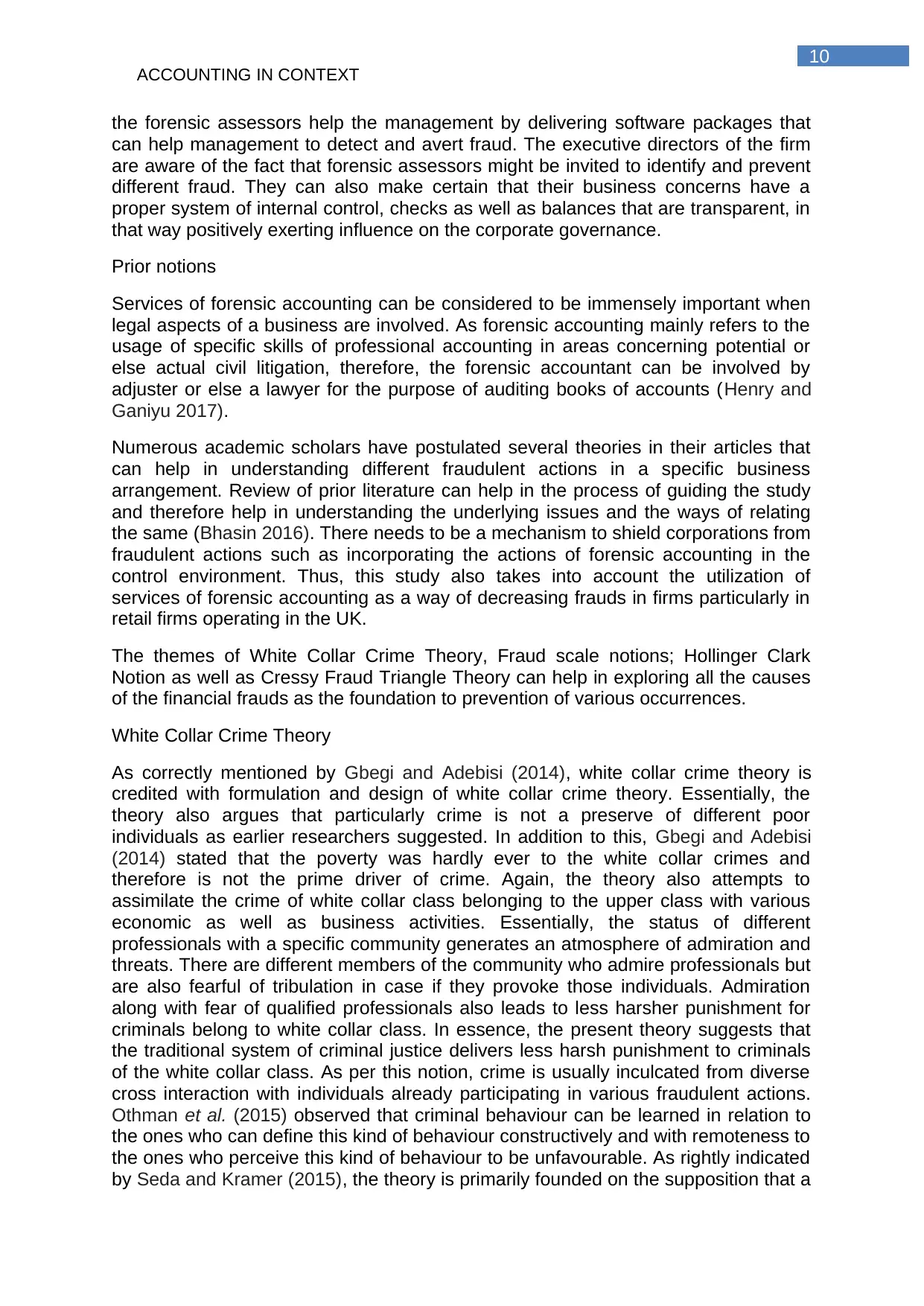
10
ACCOUNTING IN CONTEXT
the forensic assessors help the management by delivering software packages that
can help management to detect and avert fraud. The executive directors of the firm
are aware of the fact that forensic assessors might be invited to identify and prevent
different fraud. They can also make certain that their business concerns have a
proper system of internal control, checks as well as balances that are transparent, in
that way positively exerting influence on the corporate governance.
Prior notions
Services of forensic accounting can be considered to be immensely important when
legal aspects of a business are involved. As forensic accounting mainly refers to the
usage of specific skills of professional accounting in areas concerning potential or
else actual civil litigation, therefore, the forensic accountant can be involved by
adjuster or else a lawyer for the purpose of auditing books of accounts (Henry and
Ganiyu 2017).
Numerous academic scholars have postulated several theories in their articles that
can help in understanding different fraudulent actions in a specific business
arrangement. Review of prior literature can help in the process of guiding the study
and therefore help in understanding the underlying issues and the ways of relating
the same (Bhasin 2016). There needs to be a mechanism to shield corporations from
fraudulent actions such as incorporating the actions of forensic accounting in the
control environment. Thus, this study also takes into account the utilization of
services of forensic accounting as a way of decreasing frauds in firms particularly in
retail firms operating in the UK.
The themes of White Collar Crime Theory, Fraud scale notions; Hollinger Clark
Notion as well as Cressy Fraud Triangle Theory can help in exploring all the causes
of the financial frauds as the foundation to prevention of various occurrences.
White Collar Crime Theory
As correctly mentioned by Gbegi and Adebisi (2014), white collar crime theory is
credited with formulation and design of white collar crime theory. Essentially, the
theory also argues that particularly crime is not a preserve of different poor
individuals as earlier researchers suggested. In addition to this, Gbegi and Adebisi
(2014) stated that the poverty was hardly ever to the white collar crimes and
therefore is not the prime driver of crime. Again, the theory also attempts to
assimilate the crime of white collar class belonging to the upper class with various
economic as well as business activities. Essentially, the status of different
professionals with a specific community generates an atmosphere of admiration and
threats. There are different members of the community who admire professionals but
are also fearful of tribulation in case if they provoke those individuals. Admiration
along with fear of qualified professionals also leads to less harsher punishment for
criminals belong to white collar class. In essence, the present theory suggests that
the traditional system of criminal justice delivers less harsh punishment to criminals
of the white collar class. As per this notion, crime is usually inculcated from diverse
cross interaction with individuals already participating in various fraudulent actions.
Othman et al. (2015) observed that criminal behaviour can be learned in relation to
the ones who can define this kind of behaviour constructively and with remoteness to
the ones who perceive this kind of behaviour to be unfavourable. As rightly indicated
by Seda and Kramer (2015), the theory is primarily founded on the supposition that a
ACCOUNTING IN CONTEXT
the forensic assessors help the management by delivering software packages that
can help management to detect and avert fraud. The executive directors of the firm
are aware of the fact that forensic assessors might be invited to identify and prevent
different fraud. They can also make certain that their business concerns have a
proper system of internal control, checks as well as balances that are transparent, in
that way positively exerting influence on the corporate governance.
Prior notions
Services of forensic accounting can be considered to be immensely important when
legal aspects of a business are involved. As forensic accounting mainly refers to the
usage of specific skills of professional accounting in areas concerning potential or
else actual civil litigation, therefore, the forensic accountant can be involved by
adjuster or else a lawyer for the purpose of auditing books of accounts (Henry and
Ganiyu 2017).
Numerous academic scholars have postulated several theories in their articles that
can help in understanding different fraudulent actions in a specific business
arrangement. Review of prior literature can help in the process of guiding the study
and therefore help in understanding the underlying issues and the ways of relating
the same (Bhasin 2016). There needs to be a mechanism to shield corporations from
fraudulent actions such as incorporating the actions of forensic accounting in the
control environment. Thus, this study also takes into account the utilization of
services of forensic accounting as a way of decreasing frauds in firms particularly in
retail firms operating in the UK.
The themes of White Collar Crime Theory, Fraud scale notions; Hollinger Clark
Notion as well as Cressy Fraud Triangle Theory can help in exploring all the causes
of the financial frauds as the foundation to prevention of various occurrences.
White Collar Crime Theory
As correctly mentioned by Gbegi and Adebisi (2014), white collar crime theory is
credited with formulation and design of white collar crime theory. Essentially, the
theory also argues that particularly crime is not a preserve of different poor
individuals as earlier researchers suggested. In addition to this, Gbegi and Adebisi
(2014) stated that the poverty was hardly ever to the white collar crimes and
therefore is not the prime driver of crime. Again, the theory also attempts to
assimilate the crime of white collar class belonging to the upper class with various
economic as well as business activities. Essentially, the status of different
professionals with a specific community generates an atmosphere of admiration and
threats. There are different members of the community who admire professionals but
are also fearful of tribulation in case if they provoke those individuals. Admiration
along with fear of qualified professionals also leads to less harsher punishment for
criminals belong to white collar class. In essence, the present theory suggests that
the traditional system of criminal justice delivers less harsh punishment to criminals
of the white collar class. As per this notion, crime is usually inculcated from diverse
cross interaction with individuals already participating in various fraudulent actions.
Othman et al. (2015) observed that criminal behaviour can be learned in relation to
the ones who can define this kind of behaviour constructively and with remoteness to
the ones who perceive this kind of behaviour to be unfavourable. As rightly indicated
by Seda and Kramer (2015), the theory is primarily founded on the supposition that a
Paraphrase This Document
Need a fresh take? Get an instant paraphrase of this document with our AI Paraphraser
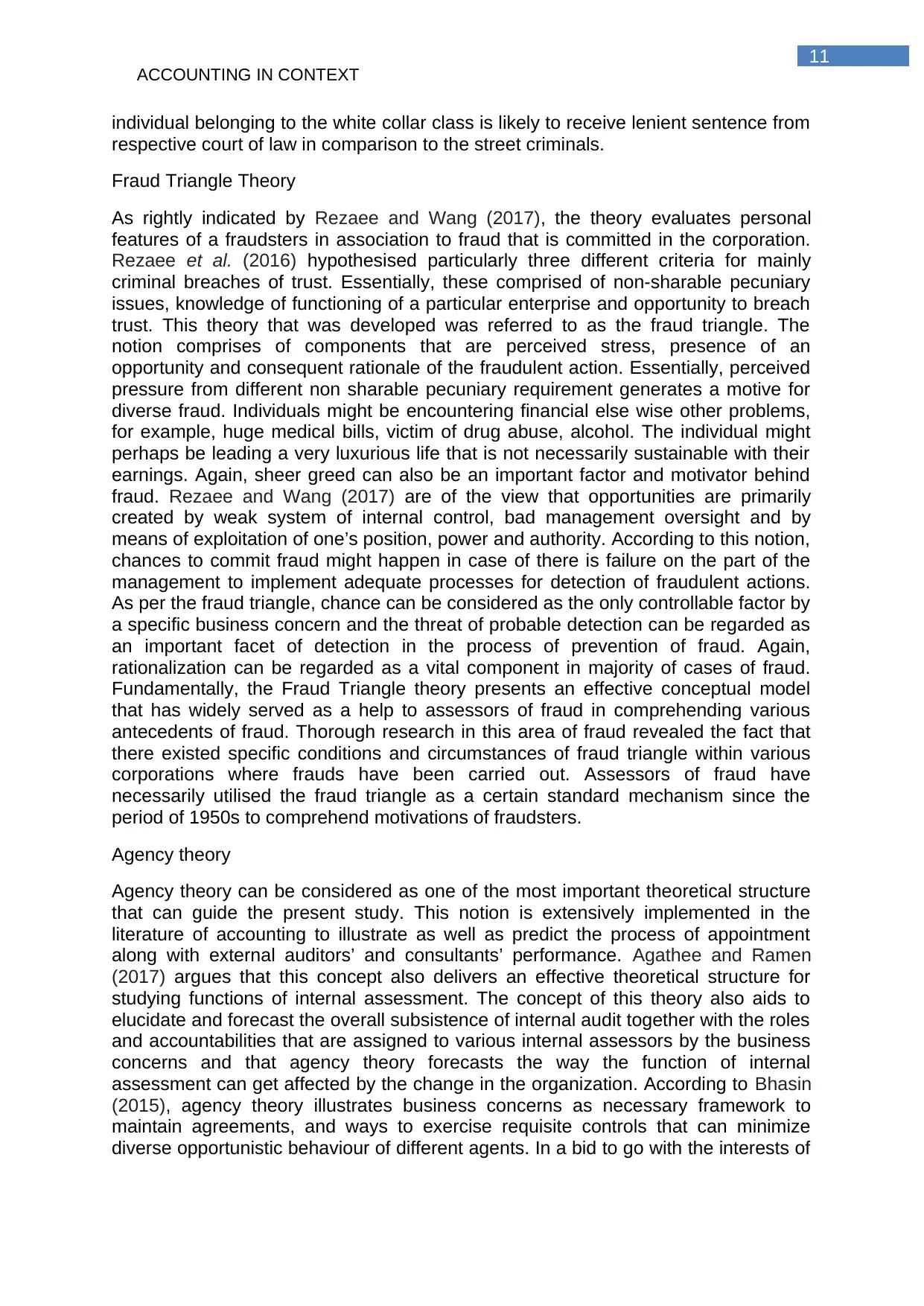
11
ACCOUNTING IN CONTEXT
individual belonging to the white collar class is likely to receive lenient sentence from
respective court of law in comparison to the street criminals.
Fraud Triangle Theory
As rightly indicated by Rezaee and Wang (2017), the theory evaluates personal
features of a fraudsters in association to fraud that is committed in the corporation.
Rezaee et al. (2016) hypothesised particularly three different criteria for mainly
criminal breaches of trust. Essentially, these comprised of non-sharable pecuniary
issues, knowledge of functioning of a particular enterprise and opportunity to breach
trust. This theory that was developed was referred to as the fraud triangle. The
notion comprises of components that are perceived stress, presence of an
opportunity and consequent rationale of the fraudulent action. Essentially, perceived
pressure from different non sharable pecuniary requirement generates a motive for
diverse fraud. Individuals might be encountering financial else wise other problems,
for example, huge medical bills, victim of drug abuse, alcohol. The individual might
perhaps be leading a very luxurious life that is not necessarily sustainable with their
earnings. Again, sheer greed can also be an important factor and motivator behind
fraud. Rezaee and Wang (2017) are of the view that opportunities are primarily
created by weak system of internal control, bad management oversight and by
means of exploitation of one’s position, power and authority. According to this notion,
chances to commit fraud might happen in case of there is failure on the part of the
management to implement adequate processes for detection of fraudulent actions.
As per the fraud triangle, chance can be considered as the only controllable factor by
a specific business concern and the threat of probable detection can be regarded as
an important facet of detection in the process of prevention of fraud. Again,
rationalization can be regarded as a vital component in majority of cases of fraud.
Fundamentally, the Fraud Triangle theory presents an effective conceptual model
that has widely served as a help to assessors of fraud in comprehending various
antecedents of fraud. Thorough research in this area of fraud revealed the fact that
there existed specific conditions and circumstances of fraud triangle within various
corporations where frauds have been carried out. Assessors of fraud have
necessarily utilised the fraud triangle as a certain standard mechanism since the
period of 1950s to comprehend motivations of fraudsters.
Agency theory
Agency theory can be considered as one of the most important theoretical structure
that can guide the present study. This notion is extensively implemented in the
literature of accounting to illustrate as well as predict the process of appointment
along with external auditors’ and consultants’ performance. Agathee and Ramen
(2017) argues that this concept also delivers an effective theoretical structure for
studying functions of internal assessment. The concept of this theory also aids to
elucidate and forecast the overall subsistence of internal audit together with the roles
and accountabilities that are assigned to various internal assessors by the business
concerns and that agency theory forecasts the way the function of internal
assessment can get affected by the change in the organization. According to Bhasin
(2015), agency theory illustrates business concerns as necessary framework to
maintain agreements, and ways to exercise requisite controls that can minimize
diverse opportunistic behaviour of different agents. In a bid to go with the interests of
ACCOUNTING IN CONTEXT
individual belonging to the white collar class is likely to receive lenient sentence from
respective court of law in comparison to the street criminals.
Fraud Triangle Theory
As rightly indicated by Rezaee and Wang (2017), the theory evaluates personal
features of a fraudsters in association to fraud that is committed in the corporation.
Rezaee et al. (2016) hypothesised particularly three different criteria for mainly
criminal breaches of trust. Essentially, these comprised of non-sharable pecuniary
issues, knowledge of functioning of a particular enterprise and opportunity to breach
trust. This theory that was developed was referred to as the fraud triangle. The
notion comprises of components that are perceived stress, presence of an
opportunity and consequent rationale of the fraudulent action. Essentially, perceived
pressure from different non sharable pecuniary requirement generates a motive for
diverse fraud. Individuals might be encountering financial else wise other problems,
for example, huge medical bills, victim of drug abuse, alcohol. The individual might
perhaps be leading a very luxurious life that is not necessarily sustainable with their
earnings. Again, sheer greed can also be an important factor and motivator behind
fraud. Rezaee and Wang (2017) are of the view that opportunities are primarily
created by weak system of internal control, bad management oversight and by
means of exploitation of one’s position, power and authority. According to this notion,
chances to commit fraud might happen in case of there is failure on the part of the
management to implement adequate processes for detection of fraudulent actions.
As per the fraud triangle, chance can be considered as the only controllable factor by
a specific business concern and the threat of probable detection can be regarded as
an important facet of detection in the process of prevention of fraud. Again,
rationalization can be regarded as a vital component in majority of cases of fraud.
Fundamentally, the Fraud Triangle theory presents an effective conceptual model
that has widely served as a help to assessors of fraud in comprehending various
antecedents of fraud. Thorough research in this area of fraud revealed the fact that
there existed specific conditions and circumstances of fraud triangle within various
corporations where frauds have been carried out. Assessors of fraud have
necessarily utilised the fraud triangle as a certain standard mechanism since the
period of 1950s to comprehend motivations of fraudsters.
Agency theory
Agency theory can be considered as one of the most important theoretical structure
that can guide the present study. This notion is extensively implemented in the
literature of accounting to illustrate as well as predict the process of appointment
along with external auditors’ and consultants’ performance. Agathee and Ramen
(2017) argues that this concept also delivers an effective theoretical structure for
studying functions of internal assessment. The concept of this theory also aids to
elucidate and forecast the overall subsistence of internal audit together with the roles
and accountabilities that are assigned to various internal assessors by the business
concerns and that agency theory forecasts the way the function of internal
assessment can get affected by the change in the organization. According to Bhasin
(2015), agency theory illustrates business concerns as necessary framework to
maintain agreements, and ways to exercise requisite controls that can minimize
diverse opportunistic behaviour of different agents. In a bid to go with the interests of
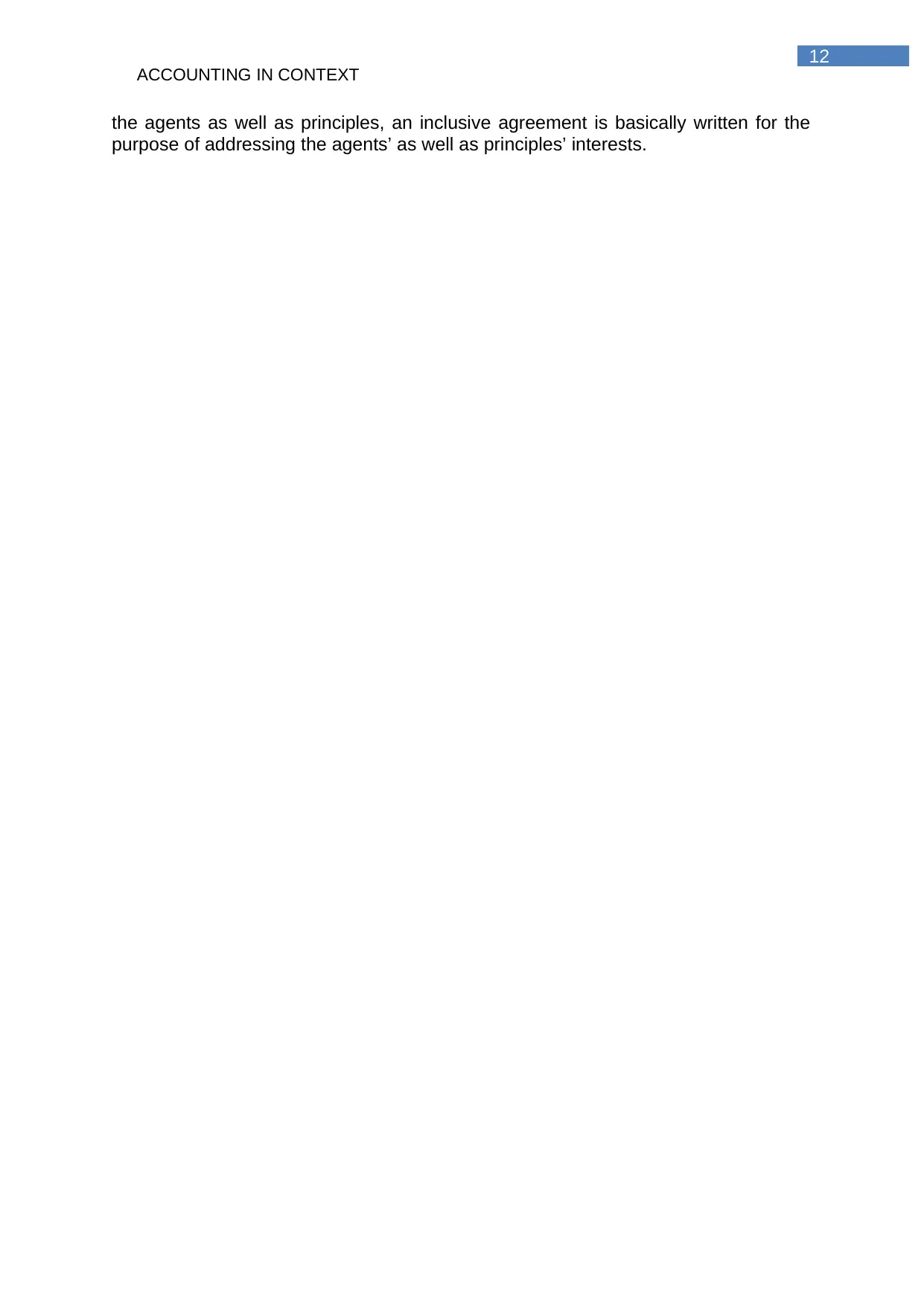
12
ACCOUNTING IN CONTEXT
the agents as well as principles, an inclusive agreement is basically written for the
purpose of addressing the agents’ as well as principles’ interests.
ACCOUNTING IN CONTEXT
the agents as well as principles, an inclusive agreement is basically written for the
purpose of addressing the agents’ as well as principles’ interests.
⊘ This is a preview!⊘
Do you want full access?
Subscribe today to unlock all pages.

Trusted by 1+ million students worldwide
1 out of 17
Related Documents
Your All-in-One AI-Powered Toolkit for Academic Success.
+13062052269
info@desklib.com
Available 24*7 on WhatsApp / Email
![[object Object]](/_next/static/media/star-bottom.7253800d.svg)
Unlock your academic potential
Copyright © 2020–2026 A2Z Services. All Rights Reserved. Developed and managed by ZUCOL.





